John Wycliffe - Trinitarian Bible Society
John Wycliffe - Trinitarian Bible Society
John Wycliffe - Trinitarian Bible Society
You also want an ePaper? Increase the reach of your titles
YUMPU automatically turns print PDFs into web optimized ePapers that Google loves.
<strong>Trinitarian</strong> <strong>Bible</strong> <strong>Society</strong> – Quarterly Record<br />
Issue Number: 565 – October to December<br />
“...in the end the truth will conquer”<br />
then the power of that institution over the<br />
politics, finances and morals of ‘Christian’<br />
Europe was absolute.<br />
The dissolute, cruel and ignorant nature of<br />
the medieval papacy and priesthood, their<br />
greed for wealth, especially the wealth of real<br />
estate, whether an entire nation or a tiny<br />
manor, are things of record. Pope Gregory IX<br />
established the Papal inquisition in 1232, and<br />
in 1302 Pope Boniface VIII proclaimed the<br />
universal jurisdiction of the Papacy. In<br />
medieval Europe the significance and value of<br />
the individual was zero; you were a fodder<br />
producer, cannon fodder or canon-law<br />
fodder, bound to the church as much as to<br />
the land.<br />
It was indeed ‘a world lit only by fire’, 5<br />
scarcely changed technologically since the fall<br />
of Imperial Rome. Regression rather than<br />
progression was the situation, and more so in<br />
the north than in the south. No printing; no<br />
light beyond that of a flame; no power beyond<br />
that of muscle, wind or water. The mechanical<br />
clock was first constructed in 1280,<br />
spectacles assembled in 1290, but very few<br />
would know of these things, let alone see, use<br />
or own them. Learning, such as there was,<br />
was the prerogative of the church. True, Paris<br />
University was begun in 1155, Oxford in<br />
1167, and Cambridge, by a body of Oxford<br />
dissidents, in 1329, but most scholars were,<br />
or became, churchmen of some level or<br />
other. Such total absorption of all of life<br />
within what can only be called an ideological<br />
monster is almost beyond our<br />
comprehension.<br />
Plantagenet England<br />
England had come to terms with the<br />
Conquest of 1066. Distinctions<br />
between Norman and Saxon, victors<br />
and vanquished, were being eroded, so that<br />
the ‘language curtain’ was coming down. The<br />
distinctive use of French as the polite language<br />
continued for a very long time, but the writings<br />
of William Langland and Geoffrey Chaucer<br />
established English, or that Saxon dialect called<br />
‘Middle English’, as a respectable, workable<br />
and robust medium of communication.<br />
The Norman royal line had become the<br />
House of Anjou, supposedly nicknamed<br />
Plantagenets because of the sprig of broom<br />
(planta genista) affected as ornament by<br />
their great men. Struggles for territory in<br />
France rumbled on. Castles in Wales, a Spider<br />
in Scotland, Crusades in Outremer, Robin<br />
Hood in Sherwood Forest, these were the<br />
exciting bits of history in schoolboy<br />
recollection, not always strictly accurate 6 in<br />
fact or chronology!<br />
The insistent dirge permeating all of this<br />
was the need to resist the territorial and<br />
financial graspings of the Bishop of Rome. In<br />
this, England suffered much, but the<br />
grotesque humiliation of the nation in King<br />
<strong>John</strong>’s time was to become a mine under the<br />
edifice of the papacy. In 1213 King <strong>John</strong><br />
resigned the power, claims and dominion of<br />
the English Crown to the Pope. In 1215 the<br />
English barons gathered at Runnymede and<br />
obliged <strong>John</strong> to sign the Magna Carta. This<br />
was a first small step towards redefining royal<br />
power, which in simplest terms said, ‘The<br />
nation, land and people, isn’t yours to give,<br />
nor the pope’s to take’. However, the annual<br />
payment of 1,000 marks to the papal coffers<br />
as a result of <strong>John</strong>’s pusillanimity continued.<br />
Resisting the political and territorial claims of<br />
the papacy led through the next three<br />
centuries to resisting the ecclesiastical and<br />
spiritual claims – led in effect to the English<br />
Reformation. Not without cost; and not<br />
without reason was it said that the chief<br />
enemy of all countries in medieval Europe<br />
was always the current Pope.<br />
<strong>John</strong> <strong>Wycliffe</strong> lived almost entirely under<br />
the reigns of Edward III and Richard II. The<br />
unrelenting burden of these monarchs was to<br />
fend off papal attempts to maintain and<br />
reassert dominion in England. Money was<br />
being siphoned away in large amounts<br />
through strange ‘cover’ taxes imposed by and<br />
collected by the Roman church, a scam<br />
further helped by the appointment of nonresident<br />
foreign clergy to church posts in<br />
England under the labyrinthine rules of papal<br />
provisors. These were the issues addressed in<br />
England by the Statutes of Provisors (clergy<br />
posts) 1350 and Praemunire (money<br />
matters) 1353. The trouble was, at any time<br />
the papacy could excommunicate you: nonpayment<br />
of taxes is a religious matter,<br />
endangering the soul! At any time the whole<br />
nation could be put under an Interdict, an<br />
enforced ‘withdrawal of co-operation’ on the<br />
part of the clergy: no proper marriages,<br />
baptisms, burials or confessions. How can we<br />
possibly enter into the paralysing fear, erosion<br />
of courage and suppression of dissent that<br />
such things induced in the superstitious<br />
minds and hearts of so many in that time?<br />
That was a time of monolithic European<br />
ecclesiastical power which pretended to have<br />
dominion over you, your family, your master,<br />
your monarch, your nation, for life, for death<br />
and for hell. What was needed was someone<br />
to say not just that the church is wrong about<br />
Oxford Today<br />
this and that particular, but simply, starkly,<br />
‘This church is wrong!’ Wrong because it is<br />
comprehensively, demonstrably un-Biblical –<br />
is in fact no church. There was need for God,<br />
who commanded the light to shine out of<br />
darkness, to give again by the mirror of His<br />
Word the light of the knowledge of the glory<br />
of God in the face of Jesus Christ. 7<br />
<strong>John</strong> <strong>Wycliffe</strong> –<br />
Scholar<br />
In the 1340s <strong>Wycliffe</strong> was at Oxford<br />
University, just towards the close of the<br />
career of Thomas Bradwardine (1290-<br />
1349). Bradwardine, then Chancellor of St.<br />
Paul’s, London, ‘confessor’ (personal<br />
chaplain) to Edward III, and briefly<br />
Archbishop of Canterbury in 1349, had been<br />
an outstanding alumnus of Oxford. More<br />
renowned as a mathematician than as a<br />
theologian, Bradwardine nonetheless wrote<br />
against the Pelagian teachings in the style of<br />
Athanasius and Augustine, insisting that God’s<br />
Grace is the ultimate necessity and cause in<br />
Salvation. This certainly found a ready place<br />
in the thinking of the young <strong>Wycliffe</strong>, and<br />
appeared in his own later tracts and theses as<br />
‘The Dominion of Grace’. 8 Bradwardine’s<br />
solemn insistence that dependence upon<br />
outward forms should not be confused with<br />
true religion of the heart also grew from seed<br />
to fruit in <strong>Wycliffe</strong>.<br />
The writings of Occam occupied <strong>Wycliffe</strong><br />
much; his interest in natural science and<br />
mathematics was considerable. He won<br />
outstanding recognition in philosophy, but<br />
applied himself most diligently to the study of<br />
theology and of ecclesiastical law. In his<br />
approach to this <strong>John</strong> <strong>Wycliffe</strong> was a real<br />
‘non-conformist’. At that time – as in some<br />
more recent times – it was not really<br />
considered necessary to master the Scriptures<br />
as a preparation for a church career! Indeed,<br />
20<br />
21


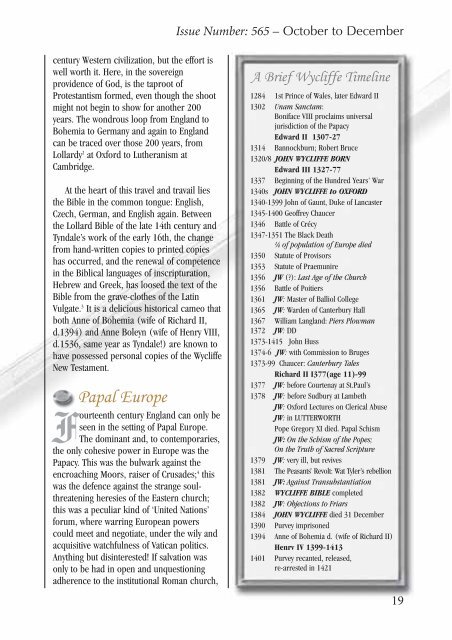
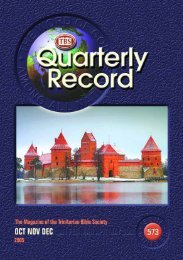
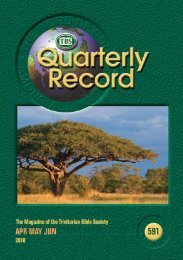
![The Love of the Truth [pdf] - Trinitarian Bible Society](https://img.yumpu.com/49788277/1/184x260/the-love-of-the-truth-pdf-trinitarian-bible-society.jpg?quality=85)
![Bible Word List and Reading Plan [pdf] - Trinitarian Bible Society](https://img.yumpu.com/46882563/1/177x260/bible-word-list-and-reading-plan-pdf-trinitarian-bible-society.jpg?quality=85)
![Click to Download Document [pdf] - Trinitarian Bible Society](https://img.yumpu.com/44904205/1/184x260/click-to-download-document-pdf-trinitarian-bible-society.jpg?quality=85)
![Download Document [pdf] - Trinitarian Bible Society](https://img.yumpu.com/44584740/1/184x260/download-document-pdf-trinitarian-bible-society.jpg?quality=85)
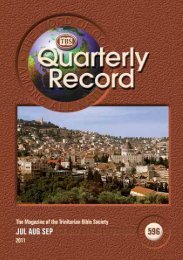
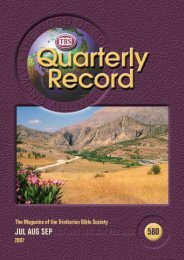
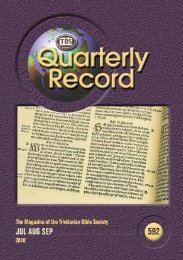
![Download Document [pdf] - Trinitarian Bible Society](https://img.yumpu.com/41007786/1/184x260/download-document-pdf-trinitarian-bible-society.jpg?quality=85)
![Click to Download Document [pdf] - Trinitarian Bible Society](https://img.yumpu.com/40894484/1/188x260/click-to-download-document-pdf-trinitarian-bible-society.jpg?quality=85)
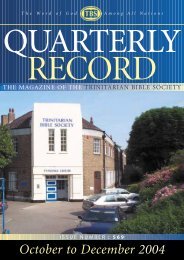
![Download Document [pdf] - Trinitarian Bible Society](https://img.yumpu.com/39425868/1/184x260/download-document-pdf-trinitarian-bible-society.jpg?quality=85)
![Download Document [pdf] - Trinitarian Bible Society](https://img.yumpu.com/39425821/1/184x260/download-document-pdf-trinitarian-bible-society.jpg?quality=85)